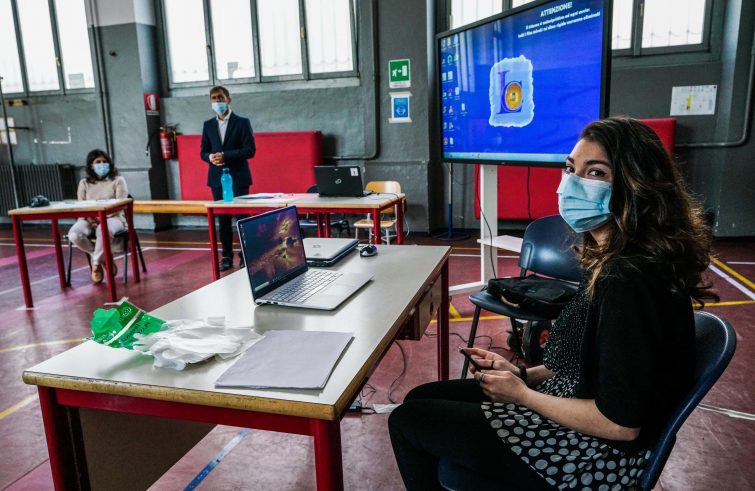
The countdown has begun: the 2021 secondary school-leaving examination in Italy, the second in a time of coronavirus pandemic, will start in exactly four weeks, on June 16. The oral exam consists of four parts, starting with the presentation of a dissertation that each student must present on a topic previously approved by the teachers: an “enhanced oral exam” lasting about 60 minutes. The examining board judges consist of six teachers, members of the class council, and an external president. Approximately 490,000 students will take the final exam, comprising internal and external candidates.
At all events, this exam is a milestone in the passage from adolescence to adulthood, awaited with anxiety and concern by all students. It remains imprinted in the memory of many of us, and sometimes resurfaces in our dreams (or nightmares) more than any other exam we may have taken. Eraldo Affinati is a writer and teacher from Rome, who founded, with his wife Anna Luce Lenzi, tuition-free Italian-language school for immigrants Penny Wirton 13 years ago. He is above all an educator, keenly aware of the needs and talents of young people.
 Professor, yet another final high-school exam in a time of COVID-19, following a challenging school year. If you had the chance to talk to the students who are preparing for their final exams, what would you tell them?
Professor, yet another final high-school exam in a time of COVID-19, following a challenging school year. If you had the chance to talk to the students who are preparing for their final exams, what would you tell them?
Dear students, you must not be overly anxious about the State exams. The exam committee includes your school teachers, those you already know, so you know what to expect. The president of the committee is the only external examiner. Your marks will be determined by the work you have done so far, so there is every reason to sit the exam without too much anxiety.
It will be most of all a way to challenge yourselves:
If you succeed, you will also gain confidence with respect to other future commitments. But even if something goes wrong, whether it be a misunderstanding, a hesitation or a moment of confusion, you should know that this is the essence of life. We cannot expect everything to always work out for the best. So we must be prepared to accept our mistakes and those of others. And move forward regardless.
What lessons can be learned and what degree of maturity have students acquired following a year and a half of pandemic? It is hardly something they can leave behind…
I don’t think one can make a blanket statement. There is no question that many young people went into crisis because of the pandemic, some of them reacted with anger to the point of self-harm, and many unfortunately dropped out of school, especially the most vulnerable ones who were already on the verge of dropping out before the pandemic. It will now be the task of the educators to help them go back to school.
However, during the long period of isolation, a great number of teens came to appreciate the value of forming part of a community. This has been a very important lesson.
What they might have taken for granted before COVID-19 they now see as the most valuable asset, namely spending an afternoon with friends, talking, laughing, having a nice time. Some young people needed to experience the absence of human relationships in order to appreciate their value. But in my opinion this will make them stronger and more aware, to the point that
In the years to come, the generations that suffered today will be the ones best equipped to help the next generation.
Science communicator Piero Angela expressed his best wishes to graduating high school students, reminding them of his high school graduation in the postwar years, amidst the rubble and the yearning for recovery. Also today we are going through a “war”, albeit an immaterial one, with more than 120,000 deaths and unseen but burdensome damage in economic, social and psychological terms. How can young people be encouraged not only to sit the exam but also, more generally, to ‘rebuild’ their future?
I agree that the coming summer months can be compared to a sort of post-war period, especially given the high death toll. But I remain hopeful.
During the pandemic period I saw many high-school students challenge themselves at the Penny Wirton school to teach Italian to their immigrant peers. This opportunity was offered by PCTO ( Pathways for cross-curricular competences and vocational guidance), formerly known as Alternanza scuola lavoro. This experience – that candidates will discuss before the Board of Examiners as part of the fourth part of the oral exam- has helped them mature as they interacted with their peers from Africa and Asia, unaccompanied minors. Notably, the reports of some of the trainees made me realise, once again, the extent to which young people are filled with energy. All they need to know is how to harness it and discover their extraordinary inner strengths, which it would be absurd to neglect. Therefore, my encouragement is to urge them to
put themselves to the test in order to give a deeper meaning to their life:
only in this way will their ideas not just remain on paper but develop into concrete action.
Not all students were able to follow the lessons remotely in optimal conditions – owing to small flats, lack of equipment, poor connectivity – especially in the south of Italy. What is your advice to teachers?
First of all, the teachers should be thanked for the extraordinary work they did, in the vast majority of situations, in conditions of utter emergency: even those teachers not familiar with technological devices for remote teaching, did their best to be present for their students, often filling the gaps caused by inadequate Wi-Fi connections and problematic living spaces. Some simply reintroduced face-to-face teaching, while others devised new forms of digital learning that might prove useful from September onwards, when in-presence classes will resume. Clearly, not everything turned out for the best: school drop-outs, as we know, have increased, so-called competences have declined, and we will now have to remedy this. But the tragic experience we have all endured has helped many people appreciate what was previously said by few, namely that schools, by entering the homes of Italians, have proved to be a spiritual cement holding together the country. This is something we should bear in mind now that we are being called upon to put the economy back on track thanks to large amounts of European funding:
Education must no longer be regarded as the fifth wheel
As has unfortunately been the case until today. Despite everything, the quality of teaching is good: otherwise, why would our students, undervalued in their homeland, frequently obtain the highest scores when completing their studies abroad?









